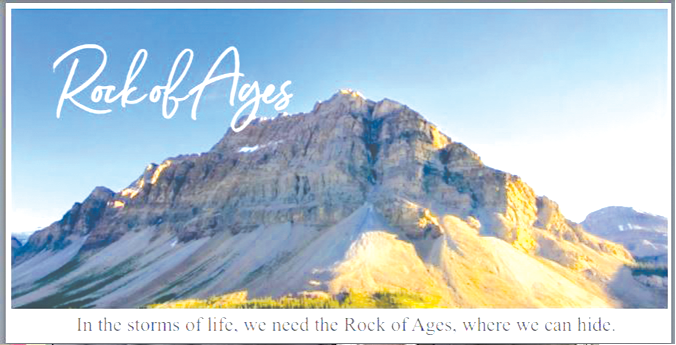
Rock of ages
A storm is a fierce uproar of strong winds accompanied by rain, thunder and lightning. It can tear apart tree branches or even uproot the trees, cause flooding, lift roofs and overturn vehicles on highways. It is a dangerous experience to be caught in a violent storm.
Advertisement
Therefore, when Reverend Augustus M. Toplady was caught in a furious storm while travelling along a valley, he counted it a blessing to find a hiding place.
Rock of Ages
He called that hiding place “Rock of Ages cleft for me.” History has it that Augustus Toplady wrote the lyrics to this popular song while hiding in the cleft of a rock that stormy day in 1762.
Suddenly, the storm was no longer just the fierce thunder, rain and lightning that were against him but the troubles of this world as well—trials, ailments, temptations, persecutions, wickedness and pain.
Doubts that bombard believers, arguments against their faith and the direct and indirect combat that the evil one wages against children of God constitute the storms of life.
For, as the apostle Paul clearly taught, “We are not fighting against flesh-and-blood enemies, but against evil rulers and authorities of the unseen world, against mighty powers in this dark world and against evil spirits in the heavenly places” (Ephesians 6:12).
Sustained in distress
As a reverend minister who had admonished his congregations on countless occasions to stand firm in their trials, Toplady knew who would sustain them in their distress.
“Rock of Ages cleft for me,” he wrote, “let me hide myself in Thee.” Looking beyond the fierce storm, he realised he needed to call on God to keep him safe on his divine pilgrimage.
Throughout the centuries since “Rock of Ages” was written by A. M. Toplady and the melody provided by Thomas Hastings, this song has enriched Christian worship and strengthened the faith of many.
Jesus is the Rock of Ages whom the hymn writer addressed. As the Rock of Ages, he is solid, secure, steady, immovable, unchanging, and is from everlasting to everlasting. He is ever ready to come to the aid of those who call on him.
His never-fading invitation is, “Come to me all who labour and are heavy-laden (burdened), and I will give you rest” (Matthew 11:28). This invitation indicates that the Lord has created a “cleft” — an opening, a split, a way and an opportunity — to welcome those who take refuge in him.
High upon a rock
In his popular Psalm 27, David alludes to the stability of this rock when he says, “In the day of trouble, the Lord will keep me safe in his dwelling, and . . . set me high upon a rock.”
Other attributes of this rock are fortress, deliverer, shield, strength, stronghold and the horn of salvation.
“From the ends of the earth I call to you,” David prayed. I call as my heart grows faint; lead me to the rock that is higher than I” (Psalm 61:2). Whenever we are overwhelmed by life’s pressures, we need the rock that is higher than us, a place of stability and security, to shield us against the storms.
Moses knew God as the only great God, a source of strength that never fails. When God instructed him to “speak” to the rock so that water would gush out for the thirsty travellers, striking it with his rod was highly inappropriate, for that rock was Christ.
Nevertheless, God protected Moses by hiding him in the cleft of a rock when he passed by so that Moses wouldn’t perish. He showed the patriarch, and by extension, all those who follow him, that he would protect us from calamity. We can rely on the Lord to hide us in the Rock of Ages cleft for us.
The double cure
While singing Toplady’s song, one phrase that must not be lost on us is, “Let the water and the blood / From Thy riven (or split) side which flowed / Be of sin the double cure / Save me from its guilt and power.
When a soldier pierced the crucified Saviour’s side with his spear, there flowed water and blood. The hymnist’s plea to the Saviour was that the water and the blood would double cure his sin.
Bible scholars state that “We ask Jesus not only to save us from God’s wrath (by cleansing us from sin’s guilt), but also make us pure (by cleansing us from sin’s power).”
When we are so cleansed and made pure, we can’t help but sing with our own gospel musician Daniel Akakpo, “I am on the Rock, the Rock at last / I am on the Rock at last / My soul has found a resting place / I am on the Rock at last.”
The writer is a publisher, author, writer-trainer and CEO of Step Publishers.
E-mail: [email protected]



